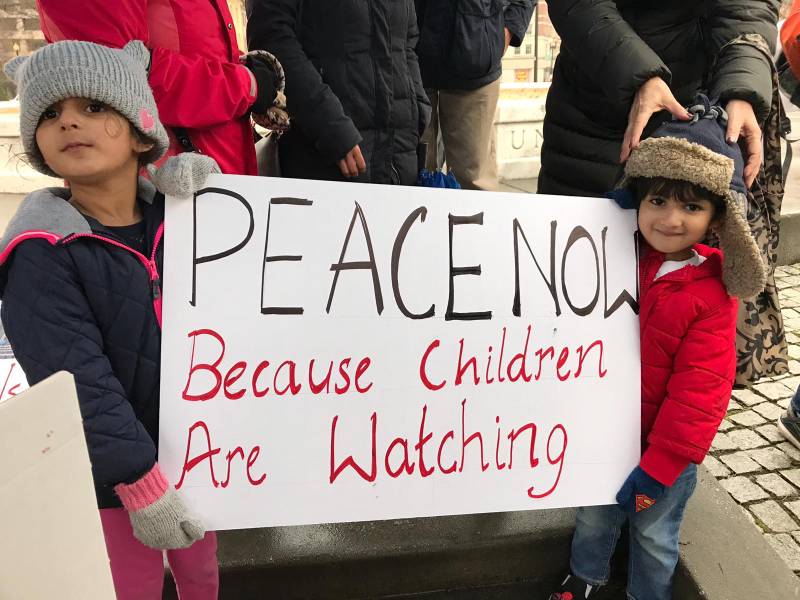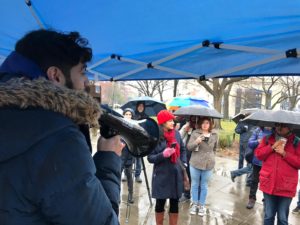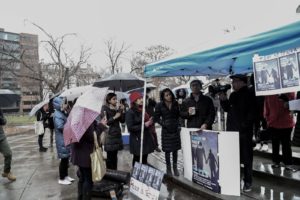
Around 50 peace activists gathered last Sunday to brave the freezing rain at Dupont Circle Washington D.C., United States, to rally against escalating hostility and threats of war between nuclear-armed states India and Pakistan, as part of a global peace day to show solidarity.
To mark the global peace day, citizens of seven countries of diverse ethnicities, scheduled simultaneous rallies to unify their voice to call for a halt to the escalating tensions between India and Pakistan. Young and old activists gathered across 20 cities including New Delhi, Bangalore, Kolkata, Bhopal, Lahore, Karachi, Washington, D.C., New York, Boston, Michigan, Dallas, San Francisco, Los Angeles, and London. They carried placards reading, “peace now” and “say no to war.”

Organisers of the Global StandOut for Peace in South Asia events in the U.S., are three female journalists and activists from South Asia. Beena Sarwar, Pawan Bali and Priyali Sur. Sarwar is the Pakistan editor for Aman Ki Asha (Hope for Peace); Bali, is an Indian journalist and film-maker based in Washington D.C; and Sur is a journalist and Indian development professional. They called on their countries to “share good neighbourly relations and resolve issues through dialogue.”
Washington D.C., based organiser Bali said, “we felt it’s important to consolidate voices so they don’t feel they are a minority and isolated.” She further explained, “what started out as a small effort by Pakistani and Indian journalists gathered steam to grow organically, and citizens all over the world joined in.” The movement started with a private posting on facebook, in response to increasing hostility over the past two weeks between the decades-old rival nations.
The past two weeks have seen an almost unprecedented escalation of tensions, since an Indian aircraft carrier crossed into Pakistan carrying out a pre-emptive air strike against Pakistani militants – retaliation for an earlier suicide bombing by Pakistani militants in Indian – controlled Kashmir; Pakistan responded by shooting down a fighter jet and capturing the pilot – who was later released as a goodwill gesture.

Despite the release of the Indian pilot, international media and organisations report fighting resumed again on Friday night on the Line of Control (LOC).
The citizen-led initiative – also called for an end to the incendiary media rhetoric from both countries that activists claim has reignited old tensions, fuelled public hostility and the escalated the tit-for-tat skirmishes.
“We urge professionals to review the core journalistic basics and ethics of verification and impartiality before rushing to be the first with news or analysis.” Said a statement released by the organisation.
The statement continued, “we recognise the pain of the people in the Jammu and Kashmir region and those who suffer the consequences of the violence.” They called for unity and “for all issues to be resolved through dialogue.”
Addressing the rally, former Pakistani Ambassador, Akbar Ahmed, read a poem "I hear it in Rumi's poetry, I know it was in Gandhi's gaze. I sense it in Mandela's oratory, I saw it Jesus's ways". He continued to read aloud to the assembled crowd, “what has the power to change me – what has the power to change me, love, love, love.” He ended the address by emphasizing the power of love to bring an end to the escalating crisis.
Also in attendance was Farhanaz Isphani, former Pakistani MNA, now a writer and poet. She read out Sahir Ludhianvi’s poetry for peace: ‘Delay The War, It Is Better’ An English translation of the poet’s verses written for India and Pakistan at the time of the Tashkent peace agreement of 1966, which resolved the 1965 war.
To mark the global peace day, citizens of seven countries of diverse ethnicities, scheduled simultaneous rallies to unify their voice to call for a halt to the escalating tensions between India and Pakistan. Young and old activists gathered across 20 cities including New Delhi, Bangalore, Kolkata, Bhopal, Lahore, Karachi, Washington, D.C., New York, Boston, Michigan, Dallas, San Francisco, Los Angeles, and London. They carried placards reading, “peace now” and “say no to war.”

Organisers of the Global StandOut for Peace in South Asia events in the U.S., are three female journalists and activists from South Asia. Beena Sarwar, Pawan Bali and Priyali Sur. Sarwar is the Pakistan editor for Aman Ki Asha (Hope for Peace); Bali, is an Indian journalist and film-maker based in Washington D.C; and Sur is a journalist and Indian development professional. They called on their countries to “share good neighbourly relations and resolve issues through dialogue.”
Washington D.C., based organiser Bali said, “we felt it’s important to consolidate voices so they don’t feel they are a minority and isolated.” She further explained, “what started out as a small effort by Pakistani and Indian journalists gathered steam to grow organically, and citizens all over the world joined in.” The movement started with a private posting on facebook, in response to increasing hostility over the past two weeks between the decades-old rival nations.
The past two weeks have seen an almost unprecedented escalation of tensions, since an Indian aircraft carrier crossed into Pakistan carrying out a pre-emptive air strike against Pakistani militants – retaliation for an earlier suicide bombing by Pakistani militants in Indian – controlled Kashmir; Pakistan responded by shooting down a fighter jet and capturing the pilot – who was later released as a goodwill gesture.

Despite the release of the Indian pilot, international media and organisations report fighting resumed again on Friday night on the Line of Control (LOC).
The citizen-led initiative – also called for an end to the incendiary media rhetoric from both countries that activists claim has reignited old tensions, fuelled public hostility and the escalated the tit-for-tat skirmishes.
“We urge professionals to review the core journalistic basics and ethics of verification and impartiality before rushing to be the first with news or analysis.” Said a statement released by the organisation.
The statement continued, “we recognise the pain of the people in the Jammu and Kashmir region and those who suffer the consequences of the violence.” They called for unity and “for all issues to be resolved through dialogue.”
Addressing the rally, former Pakistani Ambassador, Akbar Ahmed, read a poem "I hear it in Rumi's poetry, I know it was in Gandhi's gaze. I sense it in Mandela's oratory, I saw it Jesus's ways". He continued to read aloud to the assembled crowd, “what has the power to change me – what has the power to change me, love, love, love.” He ended the address by emphasizing the power of love to bring an end to the escalating crisis.
Also in attendance was Farhanaz Isphani, former Pakistani MNA, now a writer and poet. She read out Sahir Ludhianvi’s poetry for peace: ‘Delay The War, It Is Better’ An English translation of the poet’s verses written for India and Pakistan at the time of the Tashkent peace agreement of 1966, which resolved the 1965 war.
